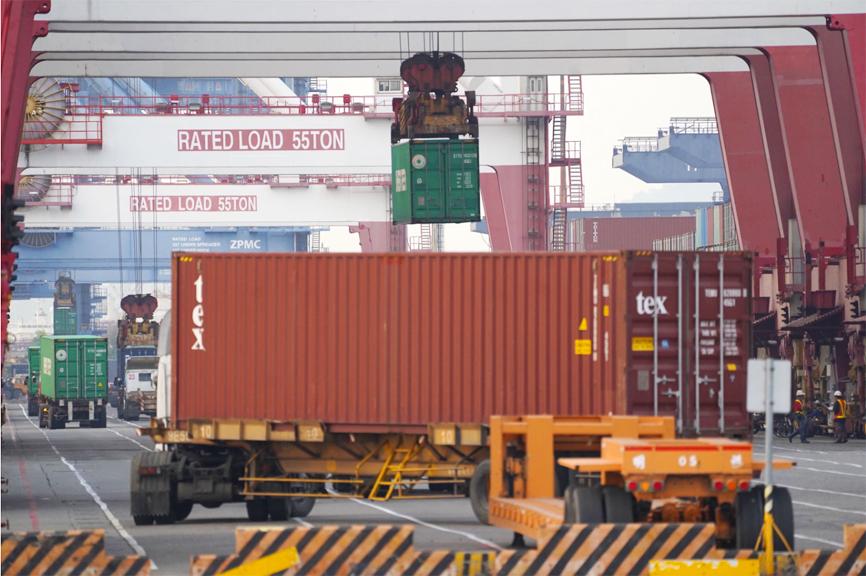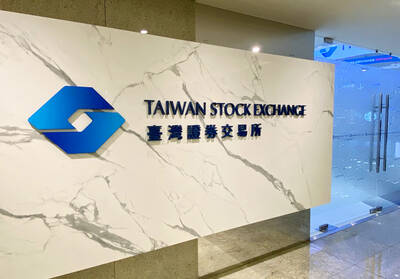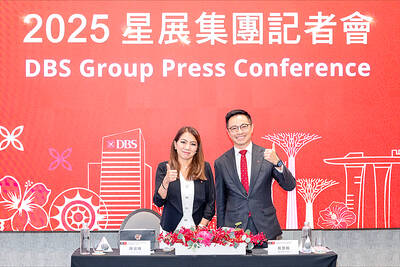The industrial production index rose 16.78 percent annually to a record high of 136.16 last month, thanks to robust demand for technology products and vehicles, while retail sales rose to surpass pre-COVID-19 pandemic levels, the Ministry of Economic Affairs said yesterday.
The index, an indicator measuring real output in manufacturing, electricity, mining and water supply, rose for the 14th consecutive month, ministry data showed.
The main momentum came from the sub-index of electronic components production — which has a 43 percent weighting in the index — expanding 26.68 percent year-on-year to 169.79, marking the 16th month it expanded by a double-digit percentage rate, the data showed.

Photo: CNA
Despite a high comparison base last year, chip production advanced 35 percent year-on-year, backed by strong demand for 5G-related devices, high-performance computing, vehicles and consumer electronics.
“Some companies told us that their factory utilization rates have improved and that some have added new production lines. Both helped increase chip output past last year’s levels,” Department of Statistics Deputy Director-General Huang Wei-jie (黃偉傑) told a news conference in Taipei.
Production of LCD panels gained 26.14 annually to 132.75, the highest since 2013, as an auto industry recovery pushed up demand for vehicle panels, while the work-from-home and stay-at-home economy boosted demand for panels used in TVs and computers, the ministry said.
Recovering auto demand also led to an annual increase of 20 percent in vehicle production last month, it added.
Production of computers and optical products registered a milder gain of 8.46 percent, after camera lens supplier Largan Precision Co (大立光) saw production decline due to order cancelations from Huawei Technologies Co (華為), Huang said.
The ministry gave a rosy outlook for industrial production this month, despite some manufacturers in Taichung facing water restrictions due to a drought.
Water supply has from early this month been restricted to five days a week.
Affected by the water rationing, machinery maker Hiwin Technologies Co (上銀科技) has asked employees to work on weekends when water is available, while taking two weekdays off.
“The ministry has asked companies to reduce their water consumption targets... So far, no company has cut production due to the water supply issue,” Huang said.
Separately, retail sales grew 12 percent annually to NT$325 billion (US$11.56 billion) last month, and 9.1 percent to NT$1.79 trillion for the first quarter, the ministry said.
Both were higher than pre-
pandemic levels of NT$300 billion in March in 2019 and NT$929 billion in the first quarter of 2019, the data showed.
Food and beverage sales totaled NT$65.2 billion last month, lower than NT$65.7 billion in March 2019, but cumulative sales totaled NT$207.2 billion last quarter, higher than the NT$206.4 billion in the same period in 2019, the data showed.
The growth could be attributed to the slow spread of COVID-19 in Taiwan, relatively strong economic growth and a booming equity market, which created a wealth effect, Huang said.
The ministry will have to monitor for one more quarter to determine whether private consumption has fully rebounded, he said.
“We have new cases of COVID-19 today and the pandemic has not be fully brought under control overseas, which could still affect local public confidence,” he said.

Taiwan Semiconductor Manufacturing Co (TSMC, 台積電) secured a record 70.2 percent share of the global foundry business in the second quarter, up from 67.6 percent the previous quarter, and continued widening its lead over second-placed Samsung Electronics Co, TrendForce Corp (集邦科技) said on Monday. TSMC posted US$30.24 billion in sales in the April-to-June period, up 18.5 percent from the previous quarter, driven by major smartphone customers entering their ramp-up cycle and robust demand for artificial intelligence chips, laptops and PCs, which boosted wafer shipments and average selling prices, TrendForce said in a report. Samsung’s sales also grew in the second quarter, up

LIMITED IMPACT: Investor confidence was likely sustained by its relatively small exposure to the Chinese market, as only less advanced chips are made in Nanjing Taiwan Semiconductor Manufacturing Co (TSMC, 台積電) saw its stock price close steady yesterday in a sign that the loss of the validated end user (VEU) status for its Nanjing, China, fab should have a mild impact on the world’s biggest contract chipmaker financially and technologically. Media reports about the waiver loss sent TSMC down 1.29 percent during the early trading session yesterday, but the stock soon regained strength and ended at NT$1,160, unchanged from Tuesday. Investors’ confidence in TSMC was likely built on its relatively small exposure to the Chinese market, as Chinese customers contributed about 9 percent to TSMC’s revenue last

Taiwan and Japan will kick off a series of cross border listings of exchange-traded funds (ETFs) this month, a milestone for the internationalization of the local ETF market, the Taiwan Stock Exchange (TWSE) said Wednesday. In a statement, the TWSE said the cross border ETF listings between Taiwan and Japan are expected to boost the local capital market’s visibility internationally and serve as a key for Taiwan becoming an asset management hub in the region. An ETF, a pooled investment security that is traded like an individual stock, can be tracked from the price of a single stock to a large and

Despite global geopolitical uncertainties and macroeconomic volatility, DBS Bank Taiwan (星展台灣) yesterday reported that its first-half revenue rose 10 percent year-on-year to a record NT$16.5 billion (US$537.8 million), while net profit surged 65 percent to an unprecedented NT$4.4 billion. The nation’s largest foreign bank made the announcement on the second anniversary of its integration with Citibank Taiwan Ltd’s (花旗台灣) consumer banking business. “Taiwan is a key market for DBS. Over the years, we have consistently demonstrated our commitment to deepening our presence in Taiwan, not only via continued investment to support franchise growth, but also through a series of bolt-on acquisitions,” DBS